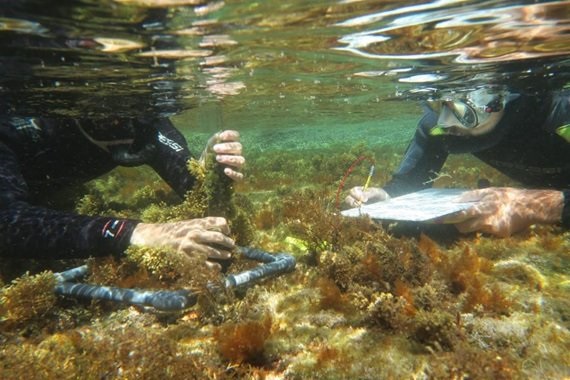
The UB receives more than 700,000 euros to protect the marine areas in Catalonia
The new scientific monitoring program of the marine sites promoted by the Department of Territory and Sustainability will expand its action range and will include all protected sites of Catalonia. To date, this monitoring was specially focused on the Natural Park of Cap de Creus and the Natural Park of Montgrí, Illes Medes and Baix Ter. With the new agreement signed together with the University of Barcelona (UB), the initiative promotes this program and is expanded to all areas included in the Plan for Spaces of Natural Interest (PEIN) and the Natura 2000 Network, from which there are no detailed scientific data like those from marine parks.
The secretary for Environment and Sustainability, Marta Subirà, noted that this program “will enable to step forward in the knowledge of the conservation state and the main trends that affect the marine species and habitats in our field”. “We are aware that our marine environment has a historic lack of knowledge, but this lack can be corrected thanks to two strategic projects to be launched this 2021. On the one hand, the monitoring of marine biodiversity in the protected marine spaces of Catalonia, now official with the agreement with the UB, and on the other, the map of marine habitats (2021-2023). These projects will enable us to advance in the knowledge of this field in order to apply the necessary public policies to guarantee its conservation”, noted Subirà.
The contract with the UB accounts for 736,527 euros and will be conducted from 2021 to 2024, aiming to improve the state of conservation and protect the biodiversity of the marine environment in the whole territory. The program continues the research activity launched by the University in 1990 and is managed by the Office of Knowledge Transfer of the UB (Bosch i Gimpera Foundation, FBG-UB).
The scientific monitoring will be coordinated by the experts Bernat Hereu (Natural Marine Parks) and Cristina Linares (PEIN and Natura 2000 Network), members of the Faculty of Biology and the Biodiversity Research Institute (IRBio) of the UB. Other participating teams of the UB and other institutions, included in the Benthic Ecology and Biology Research Group and the Marine Biodiversity Conservation Group (MEDRECOVER), with an experience in research of more than 25 years in basic research projects and applied to protected natural sites in Catalonia and other marine reserves in the Mediterranean area.
As part of the program, the team will conduct a scientific monitoring of several indicators (red gorgonian, red coral, bryozoans, algae communities, sea urchins, caves, mediolittoral communities, etc.) to assess the ecological state of biological communities and the impact of human activity (scuba diving, artisanal and sports fishing, poaching, climate change, etc.) on the marine ecosystem. There will be a warning system to enable the setting of a series of new indicators to follow in case there are sudden situations that can alter the environmental parameters which affect marine biodiversity, or unexpected situations –for instance, storms, episodes of pollution or coral poaching and potential re-plantation– to guarantee the good conservation state of the marine biodiversity in these protected spaces. “It is important to contextualize the different disturbances of the marine environment at a larger time and space scale and to add the effects of climate change to the management of protected marine spaces. The fact that the different disturbances act on a local, regional or global scale and interact with each other determines the actions or management measures that must be adopted to eliminate or reduce them”, notes ICREA academy professor and researcher Cristina Linares.

